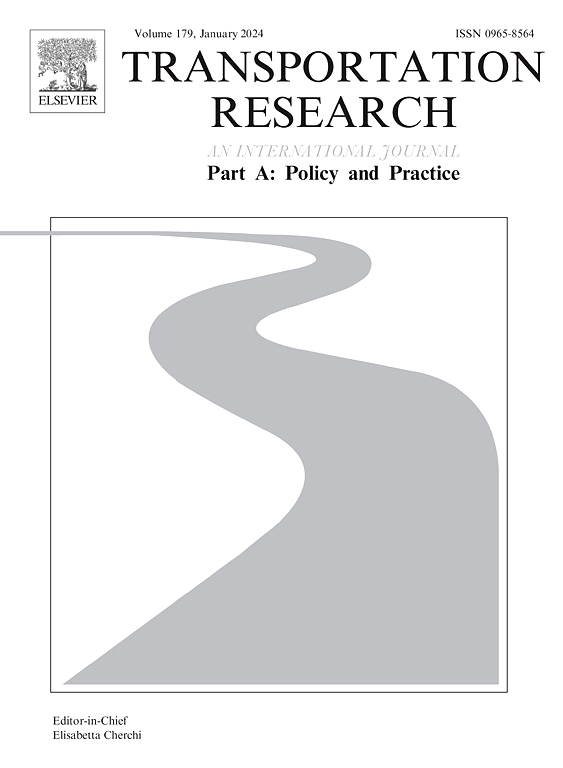了解按需送货服务中的订单取消行为
IF 6.3
1区 工程技术
Q1 ECONOMICS
Transportation Research Part A-Policy and Practice
Pub Date : 2025-05-27
DOI:10.1016/j.tra.2025.104515
引用次数: 0
摘要
数字平台的兴起通过提供广泛的按需运输和配送服务(如网约车、杂货配送和食品配送),改变了城市交通。使用这些服务的消费者通常会经历两个关键的等待阶段:在线等待匹配和实际等待司机接送。等待的一个常见后果是订单取消,这不仅扰乱了平台的运营,还造成了低效的车辆流动,给城市道路网络带来了压力。本文通过结合Heckman校正模型的两阶段生存分析,考察了两个阶段订单取消的动态及其相互作用。基于亚洲某按需食品配送平台的交付和取消订单数据集,我们揭示了几个关键发现。首先,我们发现在预期等待时间之前和之后,累积等待时间对取消的不对称影响,这为按需服务中存在参考依赖偏好提供了证据。其次,虽然更高的配送费用减少了匹配阶段的取消,但却增加了订单在匹配到司机后不久被取消的风险。第三,当订单由熟悉的司机交付时,取消的风险大大降低。最后,我们揭示了订单取消的风险如何随匹配和取货阶段的等待时间而变化。这些发现为优化定价和匹配策略提供了有价值的见解,以减少订单取消,提高按需服务的效率,并减少因订单取消而导致的低效行程。本文章由计算机程序翻译,如有差异,请以英文原文为准。
Understanding order cancellation behavior in on-demand delivery services
The rise of digital platforms has transformed urban mobility by offering a wide range of on-demand transportation and delivery services, such as ride-hailing, grocery delivery, and food delivery. Consumers using these services typically experience two key waiting stages: waiting online for matching and waiting physically for driver pick-up. A common consequence of waiting is order cancellation, which not only disrupts platform operations but also generates inefficient vehicle movements and puts strain on urban road networks. This paper examines the dynamics of order cancellations in the two stages and their interactions by using a two-stage survival analysis combined with a Heckman correction model. Based on a dataset of delivered and cancelled orders from an on-demand food delivery platform in Asia, we reveal several key findings. First, we identify an asymmetric effect of accumulated waiting time on cancellations before and after the expected waiting time, which provides evidence to the existence of reference-dependence preferences in on-demand services. Second, while higher delivery fees reduce cancellations in the matching stage, they increase the risk of orders being cancelled shortly after they are matched to drivers. Third, the risk of cancellation is significantly reduced when the order is delivered by a familiar driver. Lastly, we reveal how the risk of order cancellation varies with waiting time in both the matching and pick-up stages. These findings provide valuable insights for optimizing pricing and matching strategies to mitigate order cancellations, enhance the efficiency of on-demand services, and reduce inefficient trips caused by cancellations.
求助全文
通过发布文献求助,成功后即可免费获取论文全文。
去求助
来源期刊
CiteScore
13.20
自引率
7.80%
发文量
257
审稿时长
9.8 months
期刊介绍:
Transportation Research: Part A contains papers of general interest in all passenger and freight transportation modes: policy analysis, formulation and evaluation; planning; interaction with the political, socioeconomic and physical environment; design, management and evaluation of transportation systems. Topics are approached from any discipline or perspective: economics, engineering, sociology, psychology, etc. Case studies, survey and expository papers are included, as are articles which contribute to unification of the field, or to an understanding of the comparative aspects of different systems. Papers which assess the scope for technological innovation within a social or political framework are also published. The journal is international, and places equal emphasis on the problems of industrialized and non-industrialized regions.
Part A''s aims and scope are complementary to Transportation Research Part B: Methodological, Part C: Emerging Technologies and Part D: Transport and Environment. Part E: Logistics and Transportation Review. Part F: Traffic Psychology and Behaviour. The complete set forms the most cohesive and comprehensive reference of current research in transportation science.

 求助内容:
求助内容: 应助结果提醒方式:
应助结果提醒方式:


